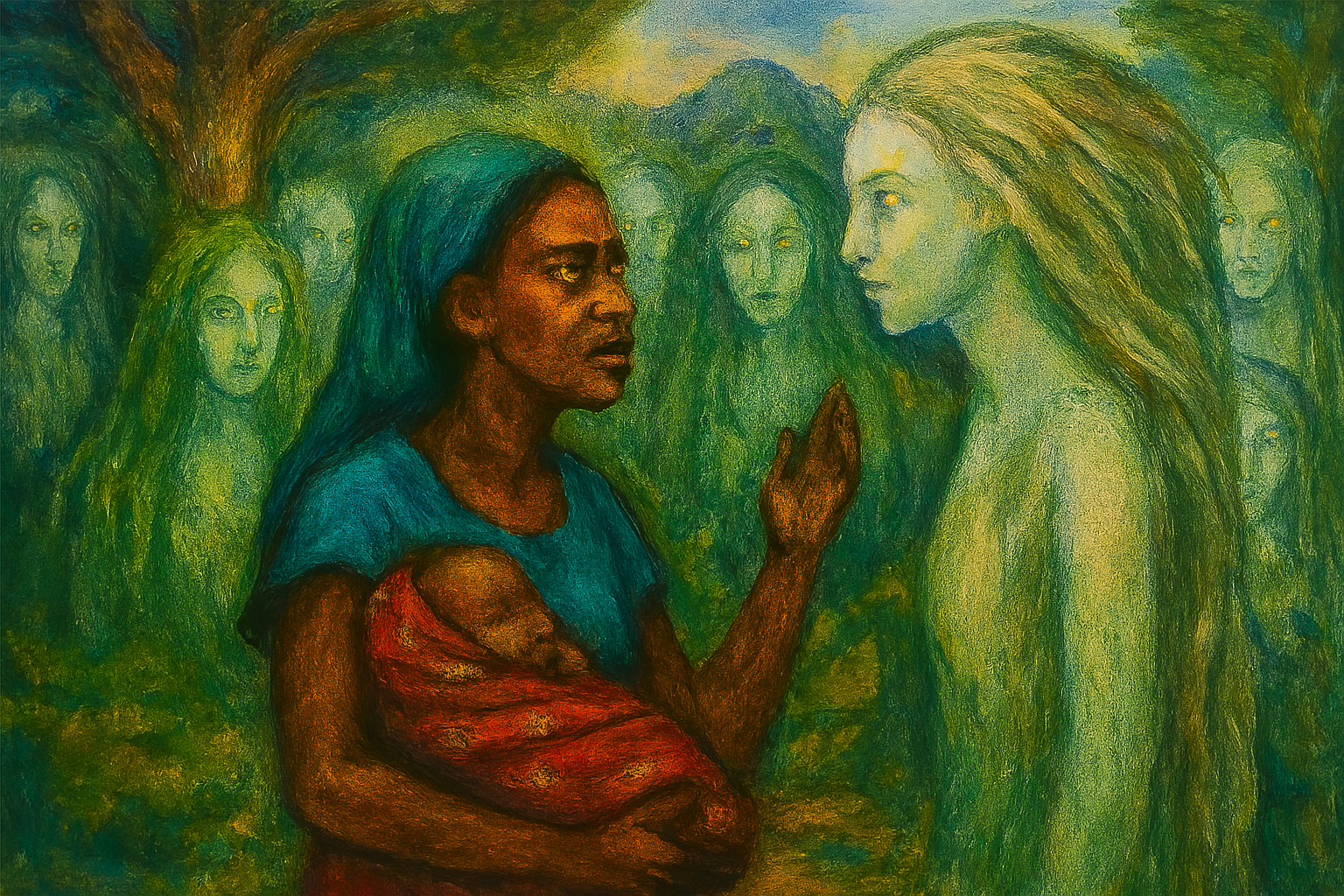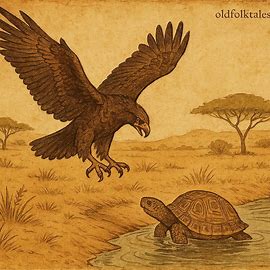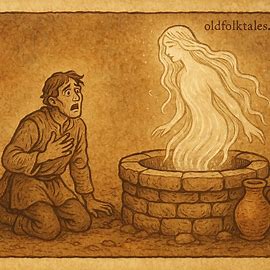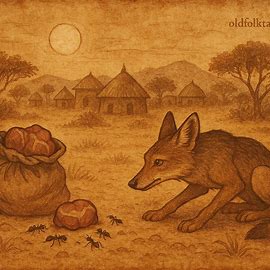Along the shores of the great African waters, where the mighty waves crash against ancient cliffs and fishing boats dance like water birds on the restless sea, there lived a fisherman’s wife whose heart was as vast as the ocean itself. Her mud-brick home, crowned with palm thatch and painted in bright patterns that told stories of her ancestors, sat overlooking a harbor where wooden boats bobbed beneath the endless sky. The salt-sweet wind carried the calls of pelicans and the rhythmic songs of the fishermen, creating a symphony that had lulled countless generations to sleep.
This woman, known throughout her coastal village for her generous spirit and clever mind, had recently been blessed with the greatest joy any mother could know, a beautiful baby boy with eyes bright as stars and skin that glowed like polished copper. The child was the light of her world, gurgling happily in his woven basket-cradle while she mended nets or prepared the day’s catch for the bustling market. Her husband would often find her singing ancient lullabies in their mother tongue, her voice weaving through their home like warm honey.
But the African coast has always been a place where the ancient spirits still walk, where the boundaries between the world of the living and the realm of the ancestors grow thin as morning mist. The fishwife knew the old stories, every mother did about the water spirits and forest dwellers who sometimes took interest in mortal children, especially those born with unusual beauty or brightness of spirit.
Also read: The Lion’s Whiskers
One morning, as the harmattan winds whispered across the waters and the first light painted the sky in shades of gold and amber, the woman woke to find something terribly wrong. The child in the basket looked like her son, bore his sweet face and perfect features, yet something fundamental had changed. Where once pure joy had sparkled in dark eyes, now there was a strange, otherworldly gleam. The baby’s laughter had transformed from innocent delight to something that made her skin prickle with unease, too knowing, too ancient for such a small body.
Her mother’s heart, that infallible compass that guides all who truly love their children, told her immediately what had happened. The spirit folk had come in the night, silent as river mist, and made their terrible exchange. They had taken her beloved child and left in his place a changeling, a spirit child glamoured to appear human but carrying within it the wild, untamed essence of the otherworld.
Most women, discovering such a horror, would have wailed their grief to the storm-dark sky or fallen into despair as deep as the ocean trenches. But this fishwife possessed the fierce determination of those who make their living from the unforgiving sea. She had not survived coastal storms and seasonal hardships by surrendering to despair.
Instead, she began to plan with the careful cunning of one who understood that spirit magic, for all its power, followed certain ancient laws. She had heard the old tales whispered by grandmothers around evening fires, stories of how the spirit folk could be outwitted by mortals clever enough to learn their ways and brave enough to challenge them directly.
For three days and nights, she watched the changeling child, studying its habits and strange behaviors. She noted how it seemed to understand conversations far beyond any mortal infant’s comprehension, how its eyes tracked movements with uncanny awareness, and how it occasionally made sounds that seemed almost like words in the ancient spirit language.
On the fourth dawn, when the morning mist hung thick between the baobab trees and the boundary between worlds grew gossamer-thin, she took action. Wrapping the changeling in her finest kente cloth, the one her own mother had woven with patterns to ward off malevolent spirits, she set out for the sacred grove that crowned the hill above her village.
These ancient trees, where her people had honored the spirits since time immemorial, still hummed with power that made sensitive souls shiver. Local folk approached the place with proper ceremony and respect, knowing it belonged to forces older than memory itself. But the fishwife walked boldly into the grove, her footsteps echoing off the great tree roots like drumbeats.
“I know what you’ve done!” she called out to the swirling morning mist, her voice carrying the authority of righteous anger. “I know you’ve taken my child and left me this poor spirit child! Show yourselves, you dwellers in shadow and moonlight, and face what you’ve done!”
For long moments, nothing stirred except the wind sighing through the ancient leaves. Then, like shapes forming from dreams, the spirit folk began to appear. They materialized from mist and shadow, tall, ethereally beautiful beings with eyes like captured lightning and faces that seemed carved from living wood and flowing water. At their head stood the Spirit Woman herself, majestic as any queen but with an otherworldly presence that made the very air shimmer around her.
“Clever mortal,” the Spirit Woman said, her voice like distant thunder mixed with flowing rivers. “You have found us out. But what would you have us do? The exchange is made according to laws older than your kind. The changeling child is yours now, as your son is ours.”
“Then I demand both children,” the fishwife declared, her heart pounding like storm waves against rocks but her voice steady as ancient stone. “You took my boy without asking, without permission, without thought for a mother’s breaking heart. If you have any honor in your immortal souls, you’ll return what you stole while letting me keep this poor spirit child who needs love just as much as any mortal baby.”
The spirit folk stirred like wind through grain, their luminous faces showing surprise at such bold demands. Spirit magic was built on ancient laws of exchange and balance, take something, leave something of equal value. But this mortal woman was demanding to upset that balance, to gain without losing, to love without limit.
“And why,” asked the Spirit Woman, her star-bright eyes studying the fishwife with new interest, “should we grant such an unprecedented request?”
“Because,” the woman replied, her voice growing stronger with the power of absolute conviction, “love is the greatest magic of all, and love doesn’t count the cost or measure the burden. This changeling child deserves a mother’s care just as much as my stolen son. I have love enough for both, room in my heart for two boys instead of one.”
Something in her words, perhaps their absolute sincerity, perhaps the recognition of a love larger than spirit magic itself, moved the ancient hearts of the spirit folk. The Spirit Woman raised her hand, and from the swirling mist stepped a figure that made the fishwife’s heart leap like a fish returning to its home waters. Her own true child, her beautiful boy, looking exactly as she remembered but somehow carrying within his bright eyes the experience of otherworldly wonders.
“So be it,” the Spirit Woman declared. “Love has spoken, and even we of the ancient realm must honor such power. Take both children, mortal mother, and raise them as your own. But know this, when the spirit child reaches his full growth, he must choose: remain in the mortal world or return to us.”
And so the fishwife returned to her home by the sea, her arms full and her heart overflowing. She raised both boys with equal love and devotion, her human son, who grew strong and brave like his father, and the changeling child, who possessed an otherworldly grace and could speak with dolphins and calm rough seas with his strange songs.
The village folk soon accepted this miracle, for coastal Africans have always understood that the world contains more mysteries than any one mind can comprehend. The two boys grew up as true brothers, sharing adventures along the rocky shores, learning the ways of boat and net, and protecting each other with the fierce loyalty that only shared childhood can create.
Years passed like the turning of tides, and eventually the changeling boy, now grown tall and strong with eyes that still held starlight, faced the moment of choice promised by the Spirit Woman. On the day he reached manhood, as the Southern Cross painted the night sky in brilliant light, the spirit folk returned to claim their answer.
“Will you come with us to the Realm of Eternal Waters?” they asked, their voices harmonizing like distant singing. “Will you take your place among your own kind, where time flows like honey and every day brings new wonders?”
The young man looked at the ethereal beings who shared his magical nature, then turned to gaze at the fishwife who had raised him, now aged and weathered by decades of coastal wind and sea spray, but still beautiful in his eyes with the beauty of unconditional love. He looked at his human brother, standing ready to support whatever choice he made, and at the home by the sea that had been his true sanctuary.
“I thank you for the honor,” he said with the dignity that marked him as noble in any realm, “but my place is here. These people didn’t just raise me, they loved me when they had no obligation to do so, claimed me when they could have turned me away. My magic will serve this place and these people, for they are my true family.”
The spirit folk accepted his decision with the grace of immortals who understand that some bonds transcend even magic. They faded back into mist and starlight, leaving behind only the whisper of wind through palm fronds and the eternal song of waves against ancient shores.
The changeling lived out his days as a beloved son and brother, using his spirit gifts to protect the fishing fleet and heal the sick, proving that love freely given creates magic more powerful than any ancient spell. And when the fishwife finally passed into her eternal rest with the ancestors, both her sons, one human, one spirit, mourned her together, united forever by the extraordinary woman who had chosen to love without limits.
Moral Lesson
This profound African folktale teaches us that love, when given freely and without condition, possesses transformative power greater than any magic. The fishwife’s decision to claim both children rather than simply recovering her stolen son, demonstrates that true love expands rather than diminishes when shared. The story shows us that family bonds are created not by blood or magic, but by the conscious choice to care for one another through joy and hardship alike. Most powerfully, it reveals that those who receive unconditional love will ultimately choose to remain with those who loved them, regardless of what other opportunities might be available.
Knowledge Check
Q1: What makes this African changeling story different from typical spirit exchange tales? A1: Unlike most changeling tales that focus on banishing the spirit child, this African folktale shows a mother who demands both her biological son and the changeling, choosing to love and raise both children equally rather than rejecting the spirit child.
Q2: Why did the spirit folk agree to the fishwife’s unusual demand for both children? A2: The Spirit Woman was moved by the fishwife’s demonstration that love doesn’t count costs or measure burdens. Her argument that “love is the greatest magic of all” and her willingness to expand her heart for two children instead of one convinced even ancient spirits to honor such extraordinary love.
Q3: What choice did the changeling face when he reached adulthood in this coastal tale? A3: Upon reaching manhood, the grown changeling had to choose between returning to the spirit folk and the Realm of Eternal Waters where he belonged by nature, or remaining with his human family who had raised him with love in the mortal world.
Q4: How does the African coastal setting contribute to this folktale’s spiritual meaning? A4: The coastal setting, with its meeting of land and sea, represents a liminal space where the boundary between mortal and spirit worlds is naturally thin. This emphasizes how love can bridge even the gap between human and spirit realms, creating connections stronger than magical barriers.
Q5: What does the changeling’s final decision reveal about the power of chosen family? A5: The changeling’s choice to remain with his human family demonstrates that love, care, and belonging created through years of shared experience can outweigh even magical nature and otherworldly heritage, showing that family bonds are built through devotion rather than blood or spiritual origin.
Q6: How does this African tale reflect cultural values about community and acceptance? A6: The story reflects African coastal values of community embrace, the importance of chosen family bonds, and acceptance of those who might seem “different.” The village’s welcoming of both children shows how true communities embrace those who are loved and claimed by their members, regardless of their origins.
Source: African folktale, coastal tradition






